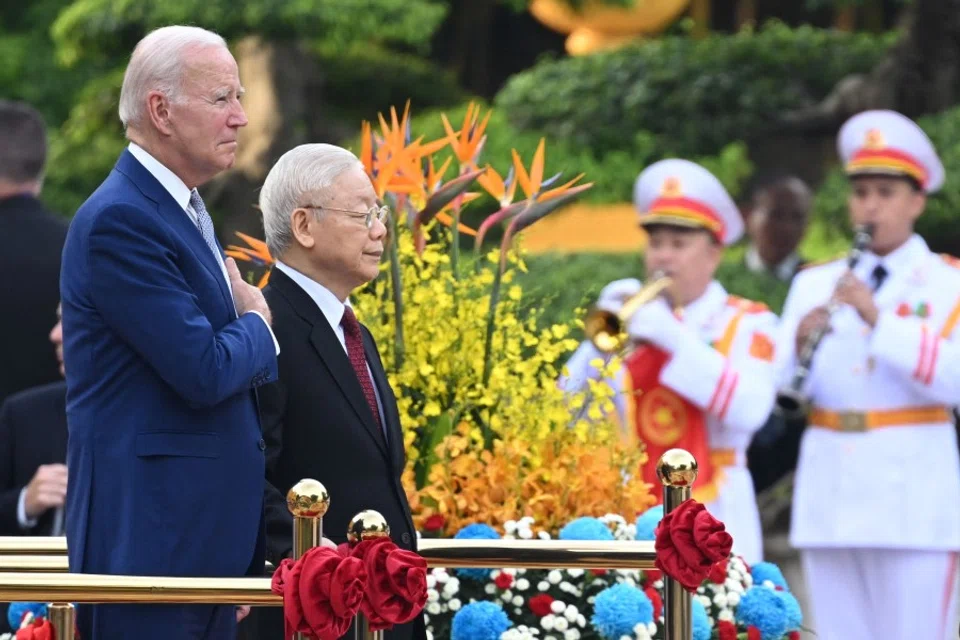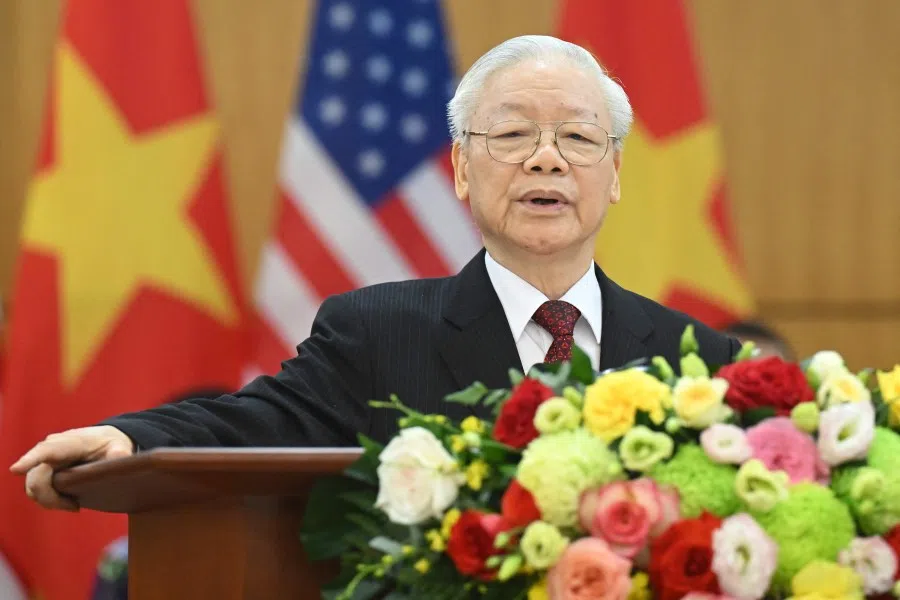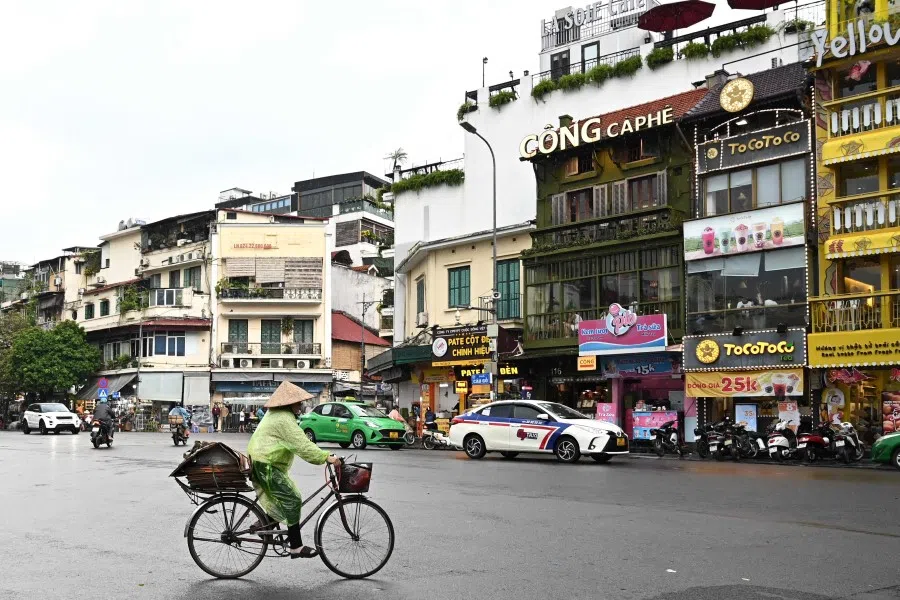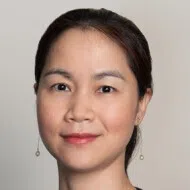How Communist Party of Vietnam achieves 'quantum leaps' in Vietnam-US relations
Communist Party of Vietnam (CPV) General Secretary Nguyen Phu Trong is actively promoting "Vietnamese bamboo diplomacy" as his foreign policy legacy. The concept is not altogether new but it has been riding upon Trong's political ascendency and Vietnam's geopolitical fortunes.

The historic upgrade of Vietnam-US relations to a comprehensive strategic partnership during US President Joe Biden's visit to Hanoi in September 2023 has been heralded as "unprecedented quantum leaps" by the Vietnamese leadership. It has also intrigued many observers of Vietnam's foreign policy.
At the heart of this remarkable development is Communist Party of Vietnam (CPV) General Secretary Nguyen Phu Trong, a conservative ideologue who did not initially appear as the most likely architect of such a transformative decision.
Remarkable breakthroughs
Prior to the upgrade, Hanoi did not let on any indications about it happening. Just a year ago, Trong paid an official visit to Beijing, where he pledged to join hands with China to combat "peaceful evolution", stay steadfast in the socialist path, and continue exchanges in theory and experience in party-building and national governance.
His anti-corruption and cadre rectification campaign bears striking resemblances to Xi Jinping's anti-corruption in China. Notably, this campaign resulted in the removal of some Western-educated or purportedly Western-orientated top leaders such as former President and Prime Minister Nguyen Xuan Phuc and former Deputy Prime Ministers Pham Binh Minh and Vu Duc Dam.
Against this backdrop and given Hanoi's years-long hesitance to establish even a "strategic partnership" with Washington, the recent breakthroughs in Vietnam-US relations are nothing short of remarkable. Several factors have contributed to this, including Washington's promise to integrate Vietnam into its "friend-shoring" of critical technology supply chains. This includes many investment deals and capacity-building initiatives that have been announced to upgrade Vietnam's semiconductor ecosystem.
Leaving a legacy
Another plausible factor is Trong's desire to carve out his own legacy. While Trong's ideological alignment and rapport with Chinese leader Xi Jinping are often highlighted for maintaining stable Vietnam-China relations, he could as well aspire to leave a lasting mark on Vietnam-US ties.
The degree to which the US is willing to blur the lines between the Vietnamese state and the CPV represents the most substantial recognition of the CPV-led regime by Washington thus far...

Trong made history in 2015 with the first-ever visit by a CPV chief to the White House. It is also noteworthy that Biden visited Vietnam at Trong's invitation, and the announcement to upgrade bilateral ties to a comprehensive strategic partnership was made during their meeting, rather than with the Vietnamese president or prime minister.
The degree to which the US is willing to blur the lines between the Vietnamese state and the CPV represents the most substantial recognition of the CPV-led regime by Washington thus far, marking a significant achievement for both the CPV and Trong.
'Vietnamese bamboo diplomacy'
Trong's ability to walk the line between Beijing and Washington has been acknowledged across the Vietnamese political spectrum. This moment presents a prime opportunity for him to bolster his legacy in Vietnam's foreign policy through the branding of "Vietnamese bamboo diplomacy".
Trong first hailed the concept at the National External Relations Conference in 2021. He described "bamboo" as having "strong roots, stout trunk and flexible branches". As such, "Vietnamese bamboo diplomacy" in his depiction is "soft and wise but still persistent and resolute; flexible and creative but consistent, valiant and resilient against all challenges and difficulties [...] resolute, persistent and patient in safeguarding the national interest".
Initially, the Vietnamese foreign policy community greeted the "bamboo diplomacy" discourse with puzzlement. It is nebulous, steeped in cultural symbolism and more importantly, it is already rooted in the well-established operating principle of "being firm in objectives but flexible in strategies and tactics" of Vietnam's foreign policy.
Rather than introducing fresh perspectives or new strategic guidance, it just validates Vietnam's strategic choices of opening up, international integration and diversification of external relations that have defined its foreign policy since the late 1980s.
... beneath this moralistic discourse lies an underpinning of pragmatism that does not fundamentally differentiate Vietnam's "bamboo diplomacy" from that of Thailand...
To further expound on Trong's vision, Vietnamese diplomats and official commentaries have introduced an array of moralistic virtues, which they proffer to be quintessentially Vietnamese, such as "bravery, sincerity, loyalty, reliability, and responsibility". The intention is to distinguish "Vietnamese bamboo diplomacy" from that of Thailand, which they perceive as prioritising expediency over principle and aligning only with a prevailing side.
However, beneath this moralistic discourse lies an underpinning of pragmatism that does not fundamentally differentiate Vietnam's "bamboo diplomacy" from that of Thailand. Their common core tenets are "flexibility and pragmatism, with independence and national interests as its basis".

Despite its lack of substantive content, the "Vietnamese bamboo diplomacy" discourse has progressed in tandem with Trong's political ascendancy as he consolidates his pre-eminent position within the Vietnamese collective leadership system in recent years. His political ascendance has also been riding upon Vietnam's geopolitical fortunes, with both the US and China vying to win the country to their respective side.
One could argue that Trong's "bamboo diplomacy" derives more from Vietnam's geopolitical happenstance than policy innovation: the discourse has gained traction as Vietnam seeks to enhance its adaptability, resilience and strategic autonomy amid increasing turbulence from great power competition.
...he [Trong] emphasised that Vietnam is currently enjoying an exceptional moment in its history, with "unprecedented fortune, potential, international stature and prestige".
Since 2021, Vietnamese propaganda outlets have diligently promoted "bamboo diplomacy" as Trong's signature foreign policy initiative. An article praising Vietnam's bamboo diplomacy recently won first prize at the National External Information Service Awards, sponsored by the CPV's Central Propaganda Department and the Steering Committee for External Information. Having garnered acclaim within the Vietnamese political system, the discourse now seeks validation from foreign dignitaries and analysts.
Trong himself has been actively crafting his own legacy. During a grassroots meeting in October, he emphasised that Vietnam is currently enjoying an exceptional moment in its history, with "unprecedented fortune, potential, international stature and prestige". He attributed this success to the wisdom of "Vietnamese bamboo diplomacy".
At a Party Central Committee meeting in October, Trong remarked that a key highlight of 2023 was robust foreign affairs activities, including the establishment of "strategic partnerships" and "comprehensive strategic partnerships" with all members of the United Nations Security Council. It appears that "Vietnamese bamboo diplomacy", alongside the anti-corruption campaign on the domestic front, stands as the twin pillars of Trong's legacy-building endeavour as the CPV gears up for its next National Congress in 2026 and beyond.
This article was first published in Fulcrum, ISEAS - Yusof Ishak Institute's blogsite.





